The Great Migration - As Seen At the Port of New York (1903)
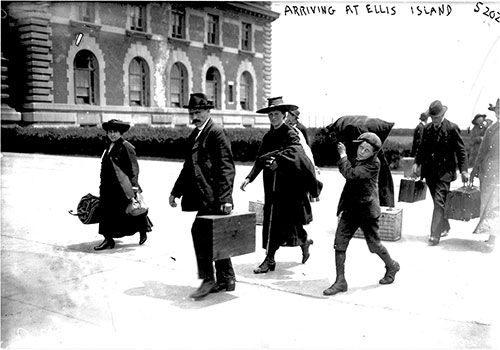
Immigrants Arriving at Ellis Island in 1907. George Grantham Bain Collection. Library of Congress # 97519082. GGA Image ID # 14859ef80d
Part One
UPON entering the port of New York, any steamship must be brought, first of all, to the quarantine station on Staten Island for inspection. After a permit has been given to pass on, the ocean liner is met by three different Government boats: the United States mail boat, which takes of the European mail; the United States revenue cutter, which brings the customs officer on board to inspect the baggage of the passengers; and the cutter of the United States Immigration Service, with boarding officers of that department.
While the ocean steamer is slowly moving up the river to her dock, the inspection of the first and second cabin passengers is being made, and as soon as the pier is reached all cabin passengers are allowed to land except those who are not citizens of the United States and whom the hoarding officer may want to take along to Ellis Island for further inquiry.
Any steerage passenger who can prove that he is a citizen of the United States and wishes to land directly at the pier may do so by permission of the boarding officer; but all other steerage passengers, after their luggage has been examined, are transferred by river boats and barges, as shown in the cut, to the landing place at Ellis Island, which is situated in the upper bay north of the Statue of Liberty and close to the New Jersey coast.
Upon arriving at the landing place, the immigrants are led along the wharf, as seen in the illustration, and carrying their hand baggage they file up to the first floor in the main building.
Here they are examined in regard to their physical condition by a physician, and those who seem to be in poor health, or show signs of sickness, are sent to the medical department for further careful inspection. Those who have passed the first examination are then inspected by two specialists in eye diseases.
The accompanying picture shows how the eyelid is turned upwards to ascertain whether the immigrant is afflicted with trachoma, the common contagious eye disease, and if so, he is not allowed to land but is held for deportation.
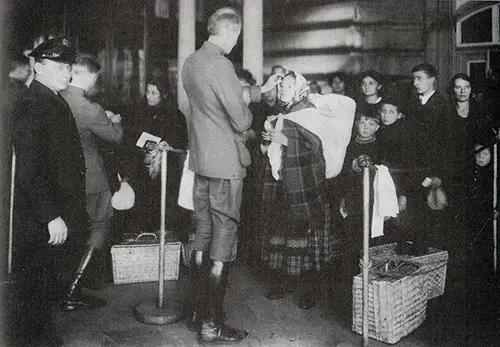
Physician Examining Eyes of Immigrants at Ellis Island
After the doctors have been passed, the immigrants come to the matrons, who question the females whether they are married or single, and hold those for whom they deem further examination necessary.
The party is now divided into groups of thirty persons, each bearing upon his breast a tag with a certain letter or number in large print. As 'soon as the members of one group are together, they are marched through a small gangway to the desk of an inspector, who has before him a list of the thirty names and the answers to twenty-two questions which have been recorded and sworn to as correct before a United States Consul at the port of departure.
These questions relate to age, sex, occupation, ability to read and write, nationality and citizenship, last residence, final destination, whether supplied with s, ticket and by whom the passage was paid, whether in possession of fifty dollars or of how much, whether ever in the country before, names of relatives and friends in America, whether at any time an inmate of prison, almshouse, insane asylum, or charitable institution, whether a polygamist or an anarchist, whether induced from home by any offer of labor in the United States, and questions concerning health, mental and physical, including deformities of body and their nature.
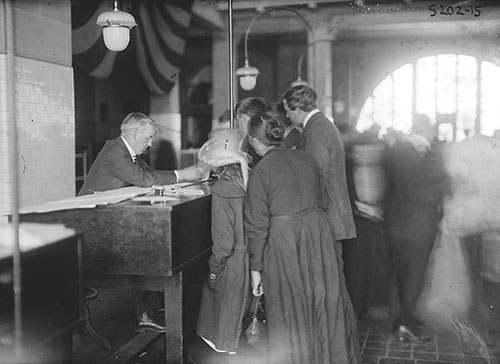
Ellis Island Examiner Questions Immigrants 1915 REPLACE
All these questions are asked again; the answers are compared and if everything seems satisfactory to the inspector, he may allow the immigrant to land by giving him a card with an "O.K." for New York, or if the place of destination has to be reached by railroad, he is given a card with "O.K. for railroad to the West."
Should immigrants say that friends or relatives will come to the landing place to meet them, they are sent to the detention room, from whence immigrants can only be released by the officer of this department after a careful examination of both parties.
If an inspector decides that he cannot admit an immigrant on his own responsibility, he gives him a card marked with the letters "S. I.," which means that the parties must be held in a separate room for "special inquiry" before a board consisting of three inspectors and one stenographer. The hearing is in secret. No friend, relative, lawyer, missionary or reporter is permitted to be present or assist the subject while he appears before this board. The immigrant is placed under oath and his testimony recorded word for word.
His fate depends upon the decision of these three officers, who may resolve by a majority to admit, defer, or exclude to be deported, in which latter case he is informed that he may appeal to the Secretary of Commerce and Labor at Washington to have the decision reversed.
While detained at the landing place, immigrants are fed at the expense of the steamship company as illustrated in the accompanying cut. Those who are admitted to proceed to their places of destination secure their railroad tickets in the railroad department at the landing place and must remain in the waiting room as seen in the picture. At five o'clock in the afternoon all the railroad passengers are transferred by river boat to the several railroad stations and from there are forwarded by special immigrant trains to the far West.
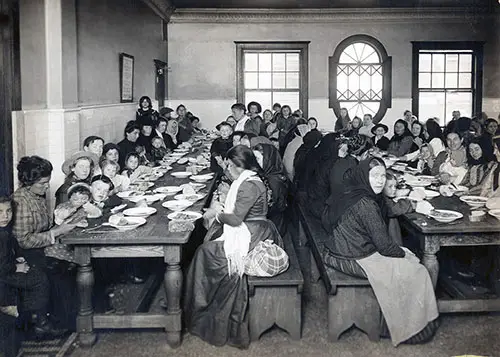
Immigrants being Fed at Ellis Island
Efficient as the immigration service is at this port, it is to be regretted that two steamship companies, one English, and one French line, make it a rule to land their passengers on our shores upon the Lord's day, and it is certainly a disgrace to our country that the Government assists them by having the department in full operation for the convenience of these steamship companies.
A respectful protest has been recently made by the missionaries at the port to the Commissioner General of Immigration at Washington, covering five points, which are here briefly summarized:
- We expect immigrants landing in America to become law-abiding residents and citizens. It therefore sets a bad example to these newcomers to find on their arrival a United States Government department in full operation on Sunday.
- The large number of officers employed on Ellis Island have very strenuous work during the week and well deserve a day of rest.
- Important as immigration may he to the United States, it certainly is not so important and pressing that we should misuse the Sabbath day for the purpose of landing foreigners.
- Steamship companies having no steamers due in New York on Sunday will not suffer even if occasionally a steamer may be delayed, while those companies which make it a rule to land immigrants on the Lord's day have no right to compel our Government to operate the landing station on Sunday for their private convenience. If the Ellis Island station would not take off immigrants on Sunday, the steamship lines would soon change their sailing day as other companies have done, for the simple reason that they wish to avoid paying higher wages to longshoremen on Sunday.
- And finally, landing on Sunday is no benefit to immigrants. The city banks are closed; mail and telegraph service is not operated as on week days; no connection can be made with river boats for eastern points, and the railroads run only a few trains,
This remonstrance was kindly received and promise was given by the Commissioners that they would attempt to close on. Sunday when only a small number of immigrants was expected to land. The closing of the landing place entirely on the Lord's day is regarded as difficult if not impossible.
PART SECOND
YONDER is a vessel steaming through the Narrows, its steerage decks black with the teeming and chaotic masses who are come to share our country and our liberty. They are all on deck now, dressed in holiday attire, crowding to the rail for a first glimpse of the huge structures in the distance, which some one tells them is New York. The word passes rapidly that the journey is over, that the promised land is reached.
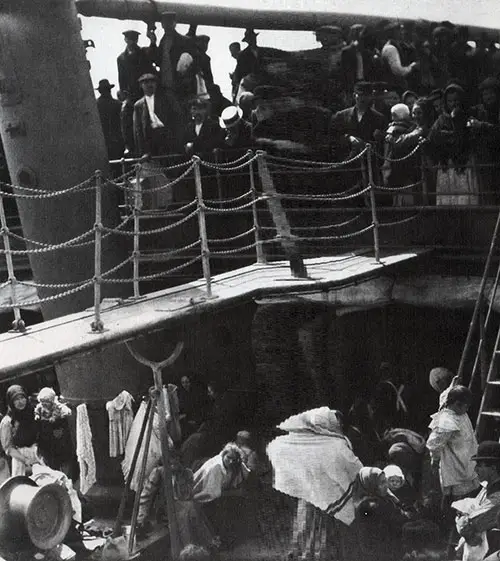
Steerage Passengers on the Deck of the Kaiser Wilhelm II
The men throw overboard their old coats, shirts, and shoes; the women smooth out and straighten their gorgeous orange, purple, green, shawls and petticoats; for the old and worn must be cast aside—everything must be clean and bright for this entrance into a new world.
How eager and expectant they are! Giovanni nudges Theresa, points excitedly and makes room for her at the rail. They lift up little Pietro and Guiseppe, for they must see too; then all four look at each other and laugh; papa pats Guiseppe on the head, and mama hugs little Pietro.
The hand luggage is brought out for each a share, from grandpa with his grape sticks and can of precious wine from the home vineyard, to tiny Pietro hugging a fat feather pillow in his chubby little arms. All are ready to start for "Little Italy" or the street of the Mulberry.
But the steamer has stopped, and why is the anchor being lowered ? They crowd around and scream at that semi-god-like individual, their countryman who has been to America before. He points to the yellow flag on the mast, while almost at the same moment there is great commotion on the deck, and they are pushed and shoved into line to be marched single file past the quarantine doctors. Unlucky ship which has any contagious or infectious disease on board! When the anchor is hoisted a mighty shout of thanksgiving rises from two thousand throats.
They spot the Statue of Liberty; next, the little children are lifted for a glimpse, the women wave their hands, the men doff their hats and shout. The band on a German liner struck up " Old Hundred" as Liberty was being passed; it sent a thrill of ardent patriotism through the hearts of those Americans who listened, thought of the words of praise, and were proud to belong to a country which had glorious opportunities and blessings for all who desired and deserved.
If the ship is docked after two o'clock in the afternoon, there comes a tedious wait for the impatient new arrivals, for they will not be transferred to Ellis Island on the huge barges until the next morning. Where the "Harvest Home" and her sister barges drop their burdens at the Island, it is there we like to watch and wonder, laugh and sorrow.
It is a long and varied procession that passes up the gang plank, through the covered passage way into the Immigration Building. The Scotch mother with her nine boy "bairns," all of whom she intends shall be Presbyterian ministers, she proudly announces.
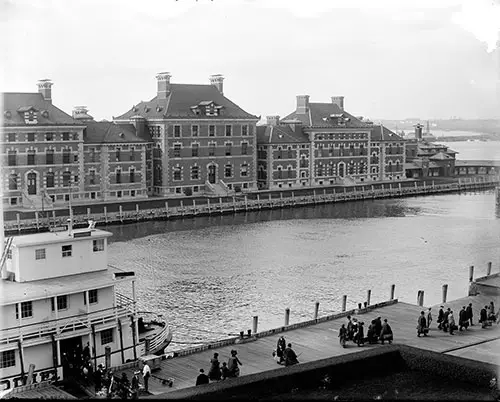
Immigrants Landing at Ellis Island
Behind her walks a mild-eyed Slovenian woman carrying an enormous sheet-wrapped pack on her back, a baby tied on in front, a heavy bag in one hand and several children clinging to her skirts, while her lord and master follows in her wake, twirling his cane!
The next are "Yiddishers "—an old patriarch, bent now, and the long curls over his ears are gray, yet he wears with a splendid dignity the proverbial Hebrew frock coat and silk hat. He and Rachel are coming to the kinder who have written that America is next best to the New Jerusalem, and they are carrying in their arms their most cherished possessions, brass candlesticks and a Russian samovar.
This Magyar woman with fourteen boys and girls clustering around her is not a charitable institution, oh, no; they are all hers, every one, and they are to wait for the husband and father who is to claim them. The little black-eyed Italian girl clad in green petticoat and scarlet bodice, toddling along with a small rocking chair in both hands, where does she belong?
She places the precious bit of furniture on the ground, seats herself in it and refuses to budge. With superb nonchalance she sits until her Sicilian mother, with a shriek, rushes upon her lost darling, soundly boxing her ears. Here are several little Italian lads, with masses of dark, curly hair, laughing brown eyes, and the chubby cheeks of cherubs.
So they disembark, little Dutch maidens, Hindu fakirs, Syrians, Sicilians, Finnish, Bohemian, in the most homogeneous mass the world has ever seen; but the Statue of Liberty looks down upon them all, the doors of the public schools are open to their children, and we need have no great fear.
The long lines enter the Administration Building, pass up the stairs and down a narrow passageway hemmed in by wire railings where stand two physicians, one to snatch off the caps of the astonished foreigners to look for favus, the other to roll .back the eyelids in search of traces of trachoma. Those who are found wanting, alas, must await further examination in the "goat pen" while the sheep with clue meekness and wondering humility proceed to the next ordeal.
Here, perched on a high stool, is a fierce looking St. Peter, red-faced with responsibility. What a task to "size up" five hundred of all tongues and races in a single day!
He sifts out the strong and industrious, leaving for the "S. L" Board, the ex-convict, pauper, contract laborer, bandit, for the United States has no room for the "L. P. C.," (liable to become a public charge) or the diseased, and in 1902 refused a landing to 4,974 hapless individuals.
The steamship companies which were so unfortunate as to bring these physical and moral wrecks must deport them at their own expense.
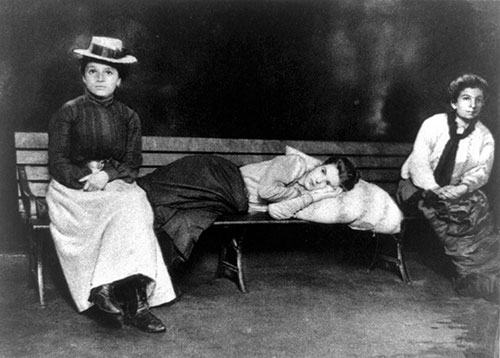
Immigrants Held at Ellis Island for Return to their Country of Origin
There are twelve of these inspectors, and they have sorted out as many as 7,000 aliens in a day, shouting, pointing, chattering half the dialects of the civilized world. There is a tradition on the Island which still causes the old inspectors to look shame faced. It was a sturdy chap with an odd little hat and a sun-browned face.
They talked to him' in Armenian, Finnish, Bohemian, Polish, Portuguese. He stood stolid and silent. They sent for more interpreters and tried Croatian, Dalmatian. Ruthenian. At last he broke forth: For the love of heaven, is there none o' yez here speaks English ?"
"Wie viel geld?" calls the inspector. "Only thirty marks, Gretchen? It won't do. But he will meet you, der Bräutigam?" "O. K." she is, and soon there is another wedding to add to the records of Ellis Island marriages. The afternoon express carries a happy lover and his radiant Frau to the farm out West.
This stalwart Swede with his rosy cheeked lads and lasses and a wallet of good money—any question about him? Indeed no—the inspector sighs, wishes there were more like him and shouts to the next victim, "Quanto Moneta?" Forty Lire? Not enough is the verdict. "Si, si," cries Tony. He has a promise of work, such good work! And he draws forth the telltale papers which cause him to be hustled off to the "excluded" room.
Here is a strapping fair-haired youth with a smiling face and a brawny arm. The inspector passes hurriedly over the questions, "Ever been in prison? Almshouse? Insane asylum? Are you an anarchist?"
No need to ask him these. Has he money? He looks downcast, for he can show only fifteen dollars; but passed be is: his face and his arms are his fortune, for at Ellis island it is the lord ensemble and the latent possibilities which save or damn. Has he money is the first question. If not, can he, far more important; win he work?
What a perfect- Nestor must the inspector be who decides these questions for four or five hundred per diem! Does he never make mistakes? Alas, too often. There were 465 of them last year; 465 who were adjudged worthy and landed, but had to be returned from whence they came before they had lived a year in the land of plenty.
The tragedy of the return, think of it. No home, no friends, no hope! But Ellis Island officials cannot pause in their busy lives to think of the tragedies, for if they did, too many would succumb to chronic melancholia.
There are three apartments in the Purgatory of the world here; for the men they are labeled "excluded" and "temporarily detained"; both classes of women occupy the third. No one knows when he enters here whether his exodus will be for a journey backward or onward.
The stolid Dutch girl with her stupid stare — has she money, friends? No. She has come to her Hans; but the telegrams fail to bring him and she must return across the water to bury her love dream.
See this cheerful little old lady. She has a cookie for the wee boy, shows the restless young girl how to knit, holds the baby for a tired mother. No one understands a word she says, but she makes every one feel more comfortable and contented. She is waiting, she tells you, for her son. He lives in Hoboken. The street, the number? No, she can't tell you these, but they will find him, he lives in Hoboken.
Her good-man died, there was no one left, so she came to her boy. But no son comes to claim her, and a steamer carries a heartsick little lady back to the public relief of Germany.
This sweet-faced young woman—insane? No, can it be? The baby was born and died on the passage over. It is a heart-broken husband who hears that Uncle Sam will not receive the insane and that his Yetta cannot stay.
We take but a peep into the men's excluded room for a momentary gaze at the depressing assembly of poor, helpless, and criminal, but fortunately, it is only a wee small percent that these rooms receive, and the vast majority pass the Scylla and Charybdis of the medical examiner and inspector safely.
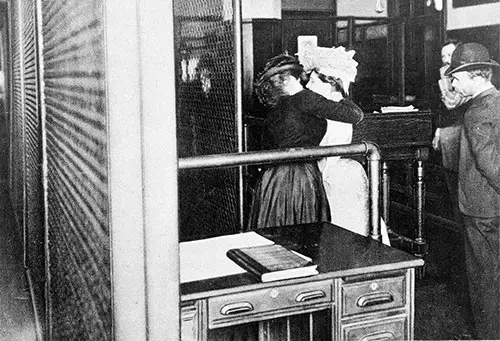
Kissing Gates - New Immigrants After Discharge from Ellis Island
For most of the journey is not yet over; they must be labeled and ticketed, Pennsylvania Railroad, Erie Railroad, New York Central Railroad, Fall River Boat, and taken on the barges to the railway terminals. They are surrounded by their Lares and Penates in the form of household goods. Such queer baggage it is!
One family is proud in the possession of a sewing machine, and an immense upholstered rocking chair, which has been its burden for thousands of miles. The next family has naught to boast of but two feather pillows which the mater familias treasures as the apple of her eye. This man hugs an enormous brass trumpet, his neighbor has a violin, while far off in the crowd we spy a Scotch Highlander with his precious bagpipes.
Those who remain in New York City, and they are, alas, far too many, are carried to the Barge Office on the Ellis Island ferry boat. Before they board it, in the long screened hallway are the happy meetings of the friends and kinsmen who have come to claim their own.
The proud Italian father declares he would never have known his ragazzi—how they have grown! The old forlorn looking Jewess is, being embraced and wept over by her finely dressed daughters from East Broadway.
Most of them have some one to greet them, but those who have not are corralled by the Immigrant Protective Societies of the various nations and taken to some good safe Home in the big city, there to stay until they have got their bearings. The Society for the Protection of Italian Immigrants has been doing particularly helpful work in this line.
Germans 40,000, British 69,000, Scandinavians 78,000, Russians 136,000, Austrians 206,000, Italians 230,000, plus Magyars, Polish, Lithuanians, Croatians, Dalmatians, Finnish, Bohemians, Greeks, Syrians and so on in endless stream numbering 857,000 aliens who have entered United States ports during the year ending June 1903.
Has man ever before witnessed so stupendous and far-reaching a migration as this the record of a single year?
We pick up our morning papers and read
" Immigrants due to arrive in New York during the next ten days"
| Ship | Originating Port | Immigrants |
|---|---|---|
| Oceanic | Liverpool | 1,140 |
| Umbria | Liverpool | 600 |
| St. Paul | Southampton | 550 |
| Columbia | Glasgow | 600 |
| Deutschland | Hamburg | 600 |
| Barcelona | Hamburg | 800 |
| Koenigin Luise | Bremen | 1,875 |
| Kaiser Wilhelm der Grosse | 805 | |
| L'Aquitaine | Le Havre | 1,953 |
| Southwark | Antwerp | 1,000 |
| Trave | Genoa | 878 |
| Sicilian Prince | Naples | 1,017 |
| Bolivia | Naples | 1,100 |
| Archimede | Naples | 813 |
| Citta di Napoli | Naples | 1,300 |
| Roma | Naples | 1,400 |
| Perugia | Naples | 1,220 |
| Sardegna | Algeria | 1,059 |
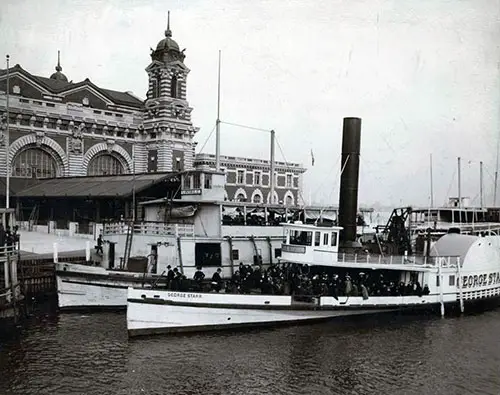
Busy Day at Ellis Island where Ferry Boats stack up with Immigrants Waiting to be Admitted
On the red letter day in April 1903, 10,236 aliens arrived in New York, and two steamers of the Hamburg-American line brought 2,731 and 2,854 steerage on a single trip.
During the last half century, eighteen million (approximately) of the peoples beyond the seas have been received and adopted to ourselves, while more and yet more come, and there is no end in sight.
The Volkwanderung of the sons of Noah, the Hebrews, Goths, Vandals, Huns, Tartars, of all the tribes and nations whose epoch-making migratory adventures have furnished an inexhaustible theme to minstrel, bard and dramatist for centuries, are as mere excursion parties compared with this marvelous pouring of the nations of the world into the land which stands for kindliness, with protection and freedom for all.
The history of these early migrations is a tale of tremendous social upheavals accompanied by long years of bloodshed, cruel misery and suffering. How different our nineteenth and twentieth-century flight of nations! Vast hordes numbering nearly a million in a single year bear down upon us, but the United States moves serenely on, undisturbed and apparently not at all awed by the thought that she is absorbing more than the natural increase of southern Italians and Slovaks; more than half the natural increase of Russian Jews, Austrian, Polish, Croatians, and Slovenians.
Every State in the union receives its share. New York leads with 203,824 in 1902, Pennsylvania next with 139,096, Massachusetts 50,939, and so on down the list to Mississippi and North Carolina, which offer attractions to only seventy-seven and seventy immigrants respectively.
'Tis a vexing problem, shall we or shall we not keep our doors open to the crowds of the other half who are coming in ever increasing numbers. The statesman shakes his head and murmurs that it is quality, not quantity, that we want now. For the type of the immigrant has changed; it is no longer the Swede, Dane, German, British—the Baltic race, but the Italian, Austrian, Russian, who are coming to us, 572,000 out of the 857,000 in 1903.
In 1882 out of the 788,000, 632,000 were Scandinavians, Germans, and British. It is the scum of the earth we are getting now, says some one. To be sure the foreign born fill our City almshouse, workhouse, and penitentiary. Seventy-seven per cent. of the almshouse inmates are foreign born, but 657 are Irish and German, this same Baltic stock we so lament, leaving only 12 per cent. of the total to the Italian, Jew and all other races; and observe that this is the first, not the second generation.
Pick up the Hoi Polloi from a land of tyranny, where the masses are slaves in everything but name, and place these same people in a country which spells opportunity, values a man for his manhood and gives his children the chance the parents never had. What will be the result? The public school teachers in New York City tell us what happens.
- Brightest pupils: Russian Jews.
- Most excellent in drawing, modeling, music: Italians,
- Most ambitious and industrious: Hebrews and Italians.
The fathers are not far behind. A night school in the Italian quarter has an average attendance of 575 boys and men from fourteen to fifty years of age, who have been in America anywhere from two days to fifteen years. This man has been wielding a pick all day while his neighbor cleaned the city's streets. Here they come four evenings a week from 7:30 to 9:30 for the knowledge of English which is to them an open sesame to all that is good in life.
There are eighty of these schools and they cost the city $500,000 a year, but there are 20,000 scholars who are being taught our language, customs and form of government.
Environment counts quite as much. S heredity in the sum total of a man, and these people inherit nothing that they or we need be ashamed of. Educate them, bring them into contact with the better class of Americans through. the mission_ and the social settlement, and who need fear for the future of our country?
Epilogue
Welcoming the Immigrant
Measuring the interest of our readers by our own interest, we feel assured they will welcome the opening article of the current number, describing the entrance of the immigrant at the chief port of the nation. The picture is drawn by eye witnesses. Mr. Sommerlatte, as Harbor missionary of the Reformed Church for several years, may be trusted to know whereof he writes.
Miss Batchelder has enjoyed an exceptional experience as United States Inspector of Immigration, and her bird's eye view includes many touches which a man would never see. Together they have given the reader of THE HOME MISSIONARY a photograph of profound significance.
The immigrant as he lands in America is a picturesque personage. Speech, dress and manners are those of the Old World. Could we follow him only a few months from the landing we should detect the beginnings of a great change. Dress and manners are the first things to be sloughed off. Broken English is the next development. More slowly the mind of this foreign-born American yields to its new surroundings.
The atmosphere of independence into which he has been transplanted begins to re-create his ambitions. He has a farm of his own, with tools and crops; his children are in our public schools. Election day comes and he votes. For the first time in his life he is a citizen, a free man, one of eighty million self-governed and self-governing people. He feels the change in every fibre of his being, as those to the manor born can never feel it, for they, never had it to feel.
Now at this point comes the crisis of this new life of the immigrant. Two ways open at his feet. Will he join the army of sordid grubbers, finding in his new heritage nothing more than acres of arable land, crops of value and markets ready to turn the toil of his hands into silver and gold?
Shall his development culminate and cease with such material rewards? Or, shall he find following him, as they followed the early New England emigrant, the church, the missionary and all kindred agencies of a Christian civilization?
Nothing but these saved the early pioneers from a selfish, vulgar and godless materialism. They injected into the enterprise of settlement the higher ideals of worship, of righteousness and of civic virtue. These entering into the blood of the first immigrants made them the great nation builders of history.
Such agencies have not lost their power and were never in demand as they are to-day, when, by thousands and tens of thousands, these strangers from the Old World, who are in fact the raw material of future citizens are pouring into the wide stretches of the West and crowding the already congested cities of the East.
Home missions has not finished its work until it shall create for the later immigrant the same environment that saved the early settler from barbarism and made him the architect of a great nation.
Sommerlatte, Rev. Paul, "The Great Migration As Seen At the Port of New York: Part First," in The Home Missionary, Volume LXXVII, No. 7, October 1903, pp. 229-235
Rev. Paul Sommerlatte is from the Harbor Missionary of the Reformed Church at Ellis Island.
Batchelder, Margaret Gold, "The Great Migration As Seen at the Port of New York: Part Second," in the Home Missionary, Volume LXXVII, No. 7, October 1903, pp. 235-246
Margaret Gold Batchelder is formerly U.S. Immigration Inspector at the Port of New York.
